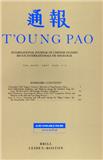| 投稿方式:Email投稿 |
- 栏目频次
- 单位占比
-
热词

-
更多
期刊简介
- TOUNG PAO《通报》(双月刊)。Founded in 1890, T’oung Pao has long been the leading scholarly journal on all aspects of traditional China. In the course of its existence, it has featured a wide range of formative contributions to Sinology by almost all major scholars in this field of ever-increasing importance. Peer-reviewed, under the guidance of its main editors, Toung Pao regularly presents the best new scholarship on China and also includes an extensive book review section.
-
基本信息
- 期刊名称:TOUNG PAO《通报》
- 主管单位:《通报》
- 主办单位:
- 国内刊号:
- 国际刊号:ISSN 0082-5433;EISSN 1568-5322
-
- 出刊日期:https://brill.com/
- 期刊定价:0
-
- 邮发代码:4区
-
- 所在省区:荷兰
- 邮政编码:
- 联系地址:PLANTIJNSTRAAT 2, P O BOX 9000, LEIDEN, NETHERLANDS, 2300 PA
-
投稿信息
-
- 学科分类:
- 版面费用:0
-
- 字数要求:0
- 查重要求:-
-
- 复合因子:0
- 综合因子:0
-
- 审 稿 费:否
- 稿费:否
- 本刊可发:0
- 特殊属性:英语
-
联系方式
- 投稿网址:
- 官网网址:
- 电话传真:
-
电子邮箱:vincent.goossaert@ephe.sorbonne.fr (官网邮箱(20201014更新))
mkern@princeton.edu (官网邮箱(20201014更新))
jrobson@fas.harvard.edu (官网邮箱(20201014更新)) - 微信公众号:

